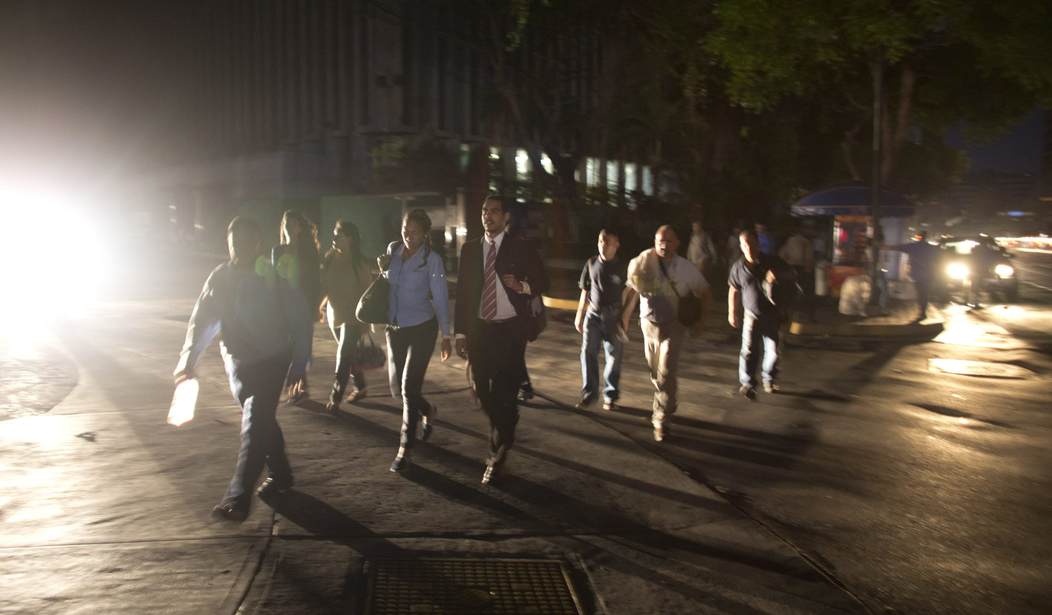“A major power outage hit crisis-stricken Venezuela on Thursday, according to Reuters … a problem the government of President Nicolas Maduro quickly blamed on “sabotage” at a hydroelectric dam that provides much of the country’s power.” National life ground to a standstill, telecommunications — including the internet — stopped working, hospitals were plunged into darkness and cities of millions lay helpless without electricity.
As the outage continued into Friday spreading to every Venezuelan state, it became clear this was going to become the biggest of the blackouts yet and Maduro’s officials increasingly pointed a finger at the United States. But the national electric grid had also been teetering for a long time. “Crumbling infrastructure and lack of investments have hit Venezuela’s power supply for years.” Outages had become a way of life and there was no easy way of proving this wasn’t “sabotage” but only more of the same dysfunction.
The government has blamed the outages on a variety of things — including pesky animals. In an Oct. 20 tweet, Energy Minister Luis Motta Dominguez named “rats, mice, snakes, cats, squirrels” as possible culprits in shorting out lines. He added: “In the list of animals mentioned above, of course iguanas are included.”
Critics, however, say insufficient investment by the government is the cause, following the 2007 nationalization of the electricity sector.
There was nevertheless circumstantial evidence for deliberate human action. For one thing, Maduro himself had long embarked on cyber attacks against his political enemies. Netblocks:
Twitter image and video servers and platform backends have been blocked in Venezuela from 3:10 PM UTC on state provider CANTV (AS8048) and its mobile network Movistar, as interim leader Juan Guaidó is set to arrive in Caracas after a tour of neighboring countries. The restrictions have been implemented as the leader calls supporters to the streets under the hashtags #4MVzlaALaCalle, #VamosVzla and #VamosJuntosALaCalle,” according to Netblocks, a site which monitors network suppression throughout the world.
Maduro had been suppressing opposition YouTube channels also. “YouTube has been restricted by Venezuela’s state-run internet provider CANTV (AS8048) for over twenty hours, according to current network measurements from the NetBlocks internet observatory. Incident timings indicate a start time coinciding with live broadcasts from the country’s National Assembly on Wednesday.”
One might speculate that Maduro had Russian help in crafting these attacks. After all, the Kremlin was reported to have taken down Ukraine’s power grid in 2015 and 2016 and might reasonably be supposed to know something about cyberwarfare.
The researchers describe that malware, which they’ve alternately named “Industroyer” or “Crash Override,” as only the second-ever known case of malicious code purpose-built to disrupt physical systems. The first, Stuxnet, was used by the US and Israel to destroy centrifuges in an Iranian nuclear enrichment facility in 2009.
Given his own guilt, Maduro would probably expect turnabout. Who knows but that even now Russian engineers are looking over the Venezuelan grid for signs that Kilroy was there? But although there’s a natural human tendency to ascribe dramatic developments to conspiracy, it’s possible to overstate it. Most of the damage to the Venezuelan power grid was indisputably caused by the mismanagement of Chavez and Maduro. They weakened it to the point of fragility. To paraphrase John le Carre, “the Bolivarian knight was dying in his armor.” All that remained was to knock it over with a feather.
Socialism almost never loses to human agency. It’s too good at propaganda and repression to be beaten easily by men. What kills it nine times out of ten, if one will pardon the expression, is God. Financial collapse, famine, pandemic, hyperinflation do most of the work. Cyber Command — or iguanas — do the rest.
Yet the Venezuelan blackout also provides a lesson in how vulnerable modern societies are to disruption. There was a lot more self-sufficiency 150 years ago when people lived off the grid. Today, much of the world depends on systems of hideous complexity to get food, water, and power and would be sore-pressed to live without it. Then some, like Venezuela, will put socialists in charge of this complex infrastructure. What could go wrong?
Tip Jar or Subscribe or Unsubscribe to the Belmont Club
Follow Wretchard on Twitter
For a list of books most frequently purchased by readers, visit my homepage.
Support the Belmont Club by purchasing from Amazon through the links below.
Books:
Survival Wisdom & Know-How: Everything You Need to Know to Subsist in the Wilderness, by The Editors of Stackpole Books. A complete, all-in-one survival guide, with information on every aspect of outdoor life and adventure, from orienteering to campfire cooking to ice climbing and beyond. A massive collection of wilderness know-how that leaves absolutely nothing to chance when it comes to surviving and thriving in the wilderness, and appreciating every minute of it.
Democracy: A Case Study, by David Moss. Through nineteen case studies, Harvard Business School professor David Moss delivers not only a first-rate history of the United States but also reveals that the nation has often thrived on conflict. Each case presents readers with a pivotal moment in U.S. history, asks them to weigh the choices and consequences, wrestle with momentous decisions, and come to their own conclusions. The reader comes away from this engaging book with a new appreciation of the country’s extraordinary resilience.
Dead Mountain: The Untold True Story of the Dyatlov Pass Incident, by Donnie Eichar. In February 1959, a group of nine experienced hikers in the Russian Ural Mountains died mysteriously on an elevation known as Dead Mountain. Eerie aspects of the incident — unexplained violent injuries, signs that they cut open and fled the tent without proper clothing or shoes, a strange final photograph taken by one of the hikers, and elevated levels of radiation found on some of their clothes — have led to decades of speculation over what really happened. This gripping book tries to solve the mystery, using the hikers’ own journals and photographs, rarely seen government records, dozens of interviews, and the author’s retracing of the hikers’ fateful journey in the Russian winter.
The Inevitable: Understanding the 12 Technological Forces That Will Shape Our Future, by Kevin Kelly. Kelly provides an optimistic road map for the future, showing how the coming changes in our lives can be understood as the result of a few long-term, accelerating forces already in motion. These deep trends – interacting, cognifying, flowing, screening, accessing, sharing, filtering, remixing, tracking, and questioning — will completely revolutionize the way we buy, work, learn, and communicate with each other. By understanding and embracing them, says Kelly, it will be easier for us to navigate these changes in ways that will benefit us. For those who seek guidance on where their business, industry, or life is heading – what to invent, where to work, what to invest in, how to better reach customers, and what to begin to put in place – this book is indispensable.
For a list of books most frequently purchased by readers, visit my homepage.
Did you know that you can purchase some of these books and pamphlets by Richard Fernandez and share them with your friends? They will receive a link in their email and it will automatically give them access to a Kindle reader on their smartphone, computer or even as a web-readable document.
The War of the Words, Understanding the crisis of the early 21st century in terms of information corruption in the financial, security and political spheres
Rebranding Christianity, or why the truth shall make you free
The Three Conjectures, reflections on terrorism and the nuclear age
Storming the Castle, why government should get small
No Way In at Amazon Kindle. Fiction. A flight into peril, flashbacks to underground action.
Storm Over the South China Sea, how China is restarting history in the Pacific










Join the conversation as a VIP Member